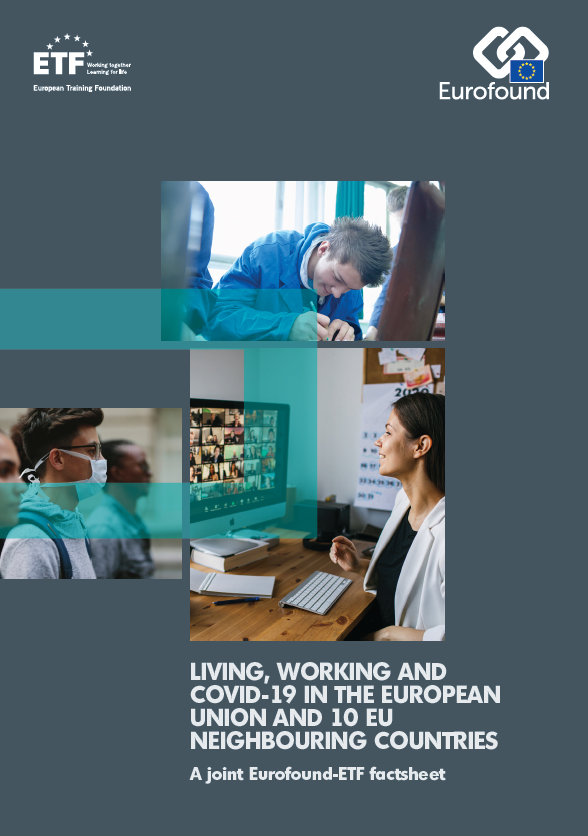
The Living, working and COVID-19 survey, first launched by Eurofound in early 2020, aims to capture the wide-ranging impact of the pandemic on the work and lives of EU citizens. The fifth round of the Eurofound survey, which was implemented in spring 2022, also sheds light on a new uncertain reality caused by the war in Ukraine, record-high inflation and sharp rises in the cost of living. As a pilot survey, a shorter version of the questionnaire was fielded by the European Training Foundation (ETF) in 10 European Union (EU) neighbouring countries. This joint Eurofound-ETF factsheet presents a selection of results from the survey covering both the EU-27 and the 10 selected EU neighbouring countries.
The results reveal at least one clear commonality across respondents from all countries: serious concerns about the rising cost of living. At the same time, the results point to a large divergence in living and working conditions between respondents in the two groups of countries, but also show large differences within the EU itself and amongst the selected EU neighbouring countries.
Key findings
- Widespread feelings of social exclusion emerged among younger respondents in the EU (28%) and in EU neighbouring countries (41%), with many expressing fears about their financial and job situation. This reflects the lasting effects of the pandemic, painting a bleak picture across Europe and highlighting the need for further policy attention, especially regarding young people.
- Health and mental well-being are a major concern across all countries, with many respondents reporting high risks of depression. The results showing 75% of those aged between 18 and 44 are at risk of depression in the EU neighbouring countries is especially alarming. Concrete policy measures to protect families against homelessness, improve childcare facilities and ensure access to quality health services, including mental care, will be critical to achieving progress in these areas.
- Poor work–life balance was reported across the board. The findings show huge diversity among countries in terms of working hours and work fatigue, with women reporting a higher frequency of tiredness due to performing most of the unpaid household work in their free time, especially in EU neighbouring countries. This highlights the need for gender-responsive active labour market measures targeting women especially, as well as effective public policies in the health and care sector.
- 70% of EU neighbouring country respondents reported a lack of sufficient access to education and training programmes. Educational and training systems offer huge potential through upskilling and reskilling for job seekers and those with lower skills, notably through public employment services. The 2023 European Year of Skills will be an important opportunity to promote effective and inclusive investment in training across Europe.
- Cost of living challenges were reported in all EU27 and EU neighbouring countries, with increases in the EU compared to previous findings in 2021 and 2020. The large number of those struggling to make ends meet is particularly striking at 48% in the EU27 and up to 81% in EU neighbouring countries where exposure to poverty is highest. Priority action under the European Pillar of Social Rights that helps create quality employment opportunities and fair social protection systems will be critical for improving resilience in the future.
- Number of pages
-
32
- Reference nº
-
EF21065
- ISBN
-
978-92-897-2301-5
- Catalogue nº
-
TJ-04-22-216-EN-N
- DOI
-
10.2806/442725
- Permalink
Cite this publication
Eurofound-ETF (2022), Living, working and COVID-19 in the European Union and 10 EU neighbouring countries, Publications Office of the European Union, Luxembourg.
